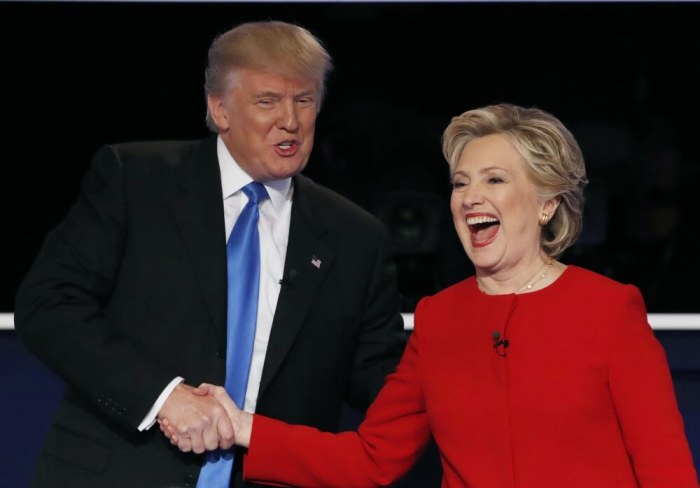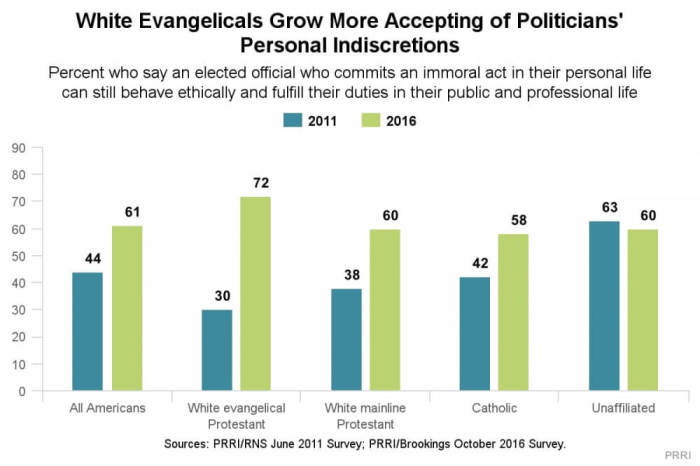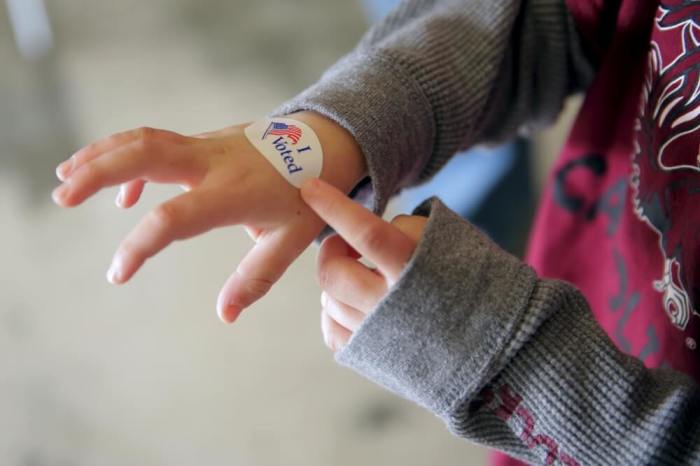Most White Evangelicals Now Say Politicians' Immoral Private Acts Don't Matter for Public Service

A new survey shows that over seven out of 10 white evangelicals believe that the immoral acts committed by politicians in their private lives don't have much effect on whether they behave ethically once they are elected into public office.
According to research released on Wednesday conducted by the Public Religion Research Institute and the Brookings Institution, 61 percent of Americans believe that political candidates who commit an immoral act in their personal lives can still fulfill the duties of public office with honesty and integrity. Meanwhile, 29 percent of Americans disagree with that statement.
The data, which was compiled from a random sample of 1,005 adults between Oct. 12 and Oct. 17 and has an error margin of +/- 3.7 percentage points, represents an increase in the amount of Americans who believe that personal immoral behavior is no precursor to any kind unethical acts such a candidate would commit as a public office holder.
In 2011, when PRRI conducted a survey asking the same question, the American public was split. Forty-four percent agreed that personal immoral behavior did not mean that a political candidate was incapable of fulfilling his or her professional duties with integrity, while 44 percent disagreed.
When breaking down the data by religious demographics, white evangelical protestants are now seemingly way more likely to agree that immoral acts committed by politicians in their personal lives don't preclude them from carrying out public duties in an ethical manner.

The survey found that 72 percent of white evangelical Protestants believe that elected officials can behave ethically even if they have committed transgressions in their personal lives. This represents a 42-percentage point increase from the 30 percent of white evangelicals who agreed with that statement in the 2011 survey.
As for white mainline Protestants, about 60 percent of them agreed that elected officials can act ethically in their public roles despite any immoral transgressions they have committed in the past. Meanwhile, 58 percent of Catholics said the same.
In 2011, only 38 percent of white mainline Protestants and 42 percent of Catholics agreed with that statement.
Compared to their religiously affiliated counterparts, religiously unaffiliated respondents remained more consistent in their answers to that question.
According to the data, 60 percent of religiously unaffiliated Americans think elected officials who have acted immorally in their personal lives can perform their public duties with integrity. In 2011, 63 percent of religiously unaffiliated voters said the same.

The respondents to the survey were also asked how important it is for presidential candidates to have "strong religious beliefs."
Today, Americans are less likely than they were in 2011 to say that it is important for the presidential candidate that they are supporting to have strong religious beliefs.
Twenty-nine percent of respondents said that it is "very" important for their presidential candidate to have strong religious beliefs, while an equal 29 percent said it is "somewhat" important, which means that about 58 percent of Americans believe that it is overall important for the presidential candidate they support to have strong religious beliefs.
In 2011, 66 percent of respondents said that it was either "very" or "somewhat" important for the presidential candidate they support to have strong religious beliefs.
As for white evangelicals, 49 percent of them said that it is "very" important for the presidential candidate they support to have strong religious views, while 39 percent of them said that strong religious views is "somewhat" important. About 11 percent of white evangelicals say that strong religious views are not important.
In 2011, almost two-thirds (64 percent) of white evangelicals said that strong religious views were "very" important when determining support for a presidential candidate, while only 28 percent said it was "somewhat" important.
Only 34 percent of white mainline protestants and 20 percent of Catholics say that strong religious beliefs are "very" important. 40 percent of Catholics in 2011 said that strong religious views were very important for a presidential candidate, while 29 percent of white mainline Protestants said the same.
Only seven percent of religiously unaffiliated respondents said that it was "very" important for presidential candidates to have strong religious views, compared to 16 percent of religiously unaffiliated voters who agreed with that statement in 2011.
According to the data, about 69 percent of white evangelical respondents expressed support for Republican presidential nominee Donald Trump, while only 15 percent of them have expressed support for Democratic nominee Hillary Clinton.
Meanwhile, about 47 percent of white mainline protestants expressed support for Trump, while 37 percent of them expressed support for Clinton. As for Catholics, 57 percent of them favor Clinton, while 33 percent of them favor Trump. Sixty-nine percent of religiously unaffiliated voters favor Clinton, while only 17 percent of them favor Trump.




























